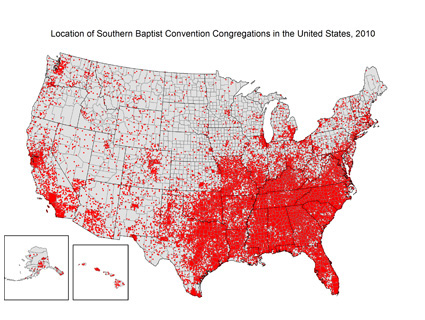Reading the cover of the latest edition of The Christian Century felt a bit like yanking the scab off an old wound.
Two conversation bubbles square off on a blue-and-red page. “Conservatives are closed-minded,” one insists. “Liberals are angry and arrogant about everything,” the other replies.
 Editor Marv KnoxActually, those retorts sound fairly calm compared to caustic comments catapulted by Southern Baptist Convention preachers and politicos during the “Baptist holy wars.” I heard and reported them in Baptist newspapers for decades. Still, the quotes hit me with a jolt.
Editor Marv KnoxActually, those retorts sound fairly calm compared to caustic comments catapulted by Southern Baptist Convention preachers and politicos during the “Baptist holy wars.” I heard and reported them in Baptist newspapers for decades. Still, the quotes hit me with a jolt.
Maybe it was because the specter of denominational battles past surfaced unexpectedly in the preceding days.
A pastor responded to my two editorials about Executive Director David Hardage’s intention to re-think the Baptist General Convention of Texas. Hardage described the here-and-now challenges of maintaining the state organization’s relevance in a post-denominational era fraught with cultural transformation and demographic upheaval. But the pastor’s email focused heavily upon Texas Baptists’ political involvement in the conflict that split national and state conventions from the late 1970s through the late ’90s and a few years beyond.
Later, another pastor sought my counsel concerning whether his congregation should align with the Southern Baptists of Texas Convention, the group that split from the BGCT in the fallout out of the national schism. “I know you will be objective,” he concluded. Talk about pressure.
Divisions continue to haunt
Both engagements ended amicably—the first after email exchanges of three rounds each, and the second after a pleasant phone conversation. But they reminded me the right/left, fundamentalist/liberal, conservative/moderate division continues to haunt Baptists.
Not coincidentally, our partners at ABPnews/Herald have published excellent articles on this topic in recent weeks. See Mercer University ethics professor David Gushee’s trilogy here, here and here. See the reply from Mark Wingfield, associate pastor at Wilshire Baptist Church in Dallas, here.
Sign up for our weekly edition and get all our headlines in your inbox on Thursdays
 From the 2010 U.S. Religion Census: Religious Congregations & Membership StudyThe common theme of Gushee’s and Wingfield’s columns is compelling and clear: Twenty-three years after the Southern Baptist Convention split, it’s past time to move on. I agree and would add in particular, 16 years after the BGCT split, it’s time to move on. That’s a truth I hope I communicated to the pastors who contacted me recently.
From the 2010 U.S. Religion Census: Religious Congregations & Membership StudyThe common theme of Gushee’s and Wingfield’s columns is compelling and clear: Twenty-three years after the Southern Baptist Convention split, it’s past time to move on. I agree and would add in particular, 16 years after the BGCT split, it’s time to move on. That’s a truth I hope I communicated to the pastors who contacted me recently.
Actually, moving on is not really that hard. Just get busy. Here at Baptist Standard Publishing, we spend all our time trying to figure out how to gather and make sense of news that matters to people of faith; how to launch and build our resources website/social network, FaithVillage.com; and how to pay the bills. Personally—and I realize this is ironic coming from a journalist who covered almost all those Baptist battles—I seldom think about all that stuff. It’s over.
Repentance and forgiveness
But still, a two-part step is needed—repentance and forgiveness.
After so many years, much of what remains of all that conflict is the detritus of unrepentant, unforgiving spirits. It helps explain why individuals cannot move on and why some churches cannot make a decision about affiliation.
Of course, partisans from both sides still feel they were the aggrieved party. They can’t conceive how the others even think they were wronged. But anger, malice, envy and acrimony invaded every heart that pumped through that painful era of Baptist history.
Repentance and forgiveness do not require glossing over theological and ecclesiological differences or pretending wrongs never occurred. In fact, failure to acknowledge the truth of the conflict blocks repentance and impedes forgiveness.
Repentance and forgiveness do not require reunification, either. Reunification of the SBC and the BGCT are no more likely—or desirable—than the remarriage of a divorced couple after they both have married other spouses and delivered other children.
Repentance and forgiveness do not even require liking the “other.” Baptists on opposite sides of the state and national divides truly differ. They hold divergent views, not only on Bible interpretation and theology, but also on church, science, politics, economics and family. Not a lot in common.
Humility required
But repentance and forgiveness do require humility. This involves acknowledging the possibility of being wrong or, barring that, at least doing wrong.
Repentance and forgiveness also require willful agape love. If we are sisters and brothers in Christ, then Jesus’ prayer in John 17 and the Epistles of John compel us to love each other, to wish God’s blessing upon each other. If we can’t do it for each other, we must do it for the cause of Christ, as a testimony to a world riven with hate. We also should do it for our children and grandchildren, whose faith will be healthier if we don’t force them to revisit the charred landscapes of denominational battlefields.
Yes, it’s time to move on. It’s time to be who we are now, going forward, no longer looking back. And it’s time to proceed with hearts cleansed by repentance and forgiveness.
















We seek to connect God’s story and God’s people around the world. To learn more about God’s story, click here.
Send comments and feedback to Eric Black, our editor. For comments to be published, please specify “letter to the editor.” Maximum length for publication is 300 words.